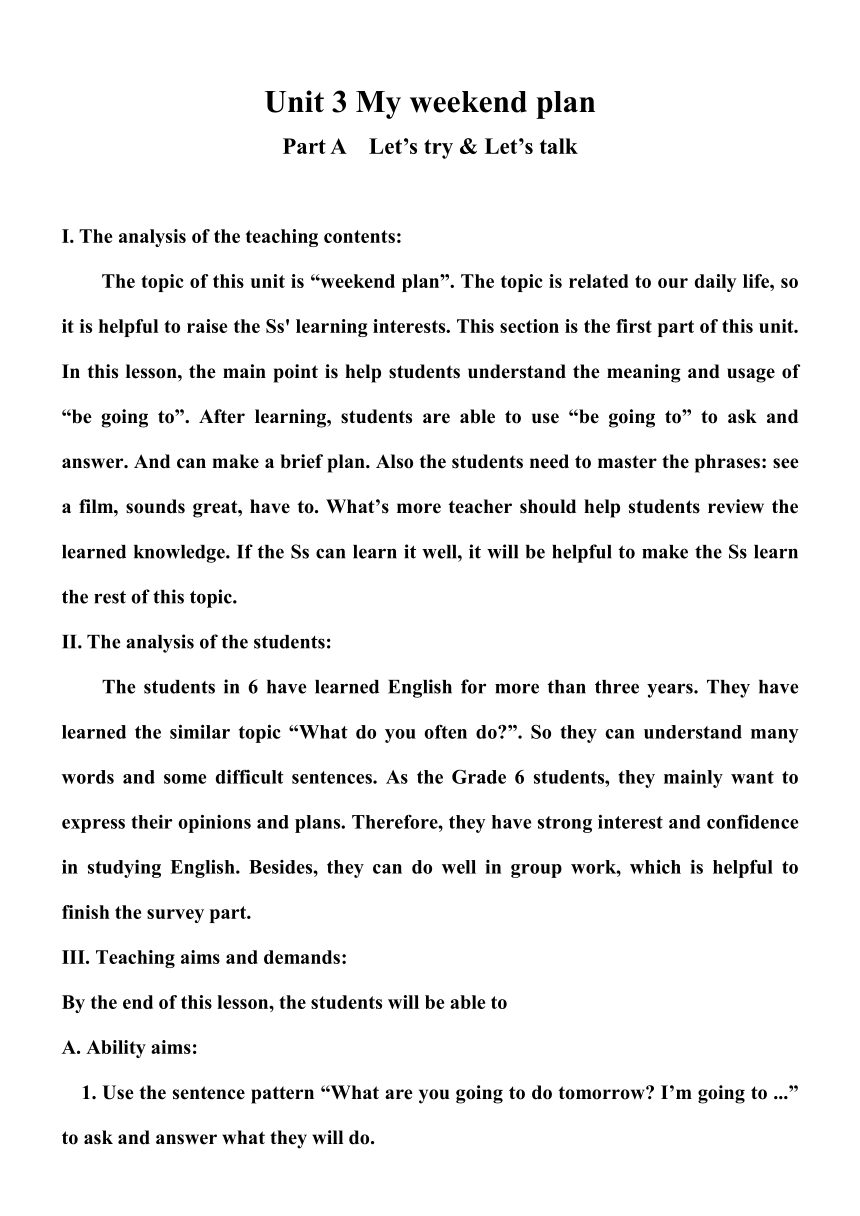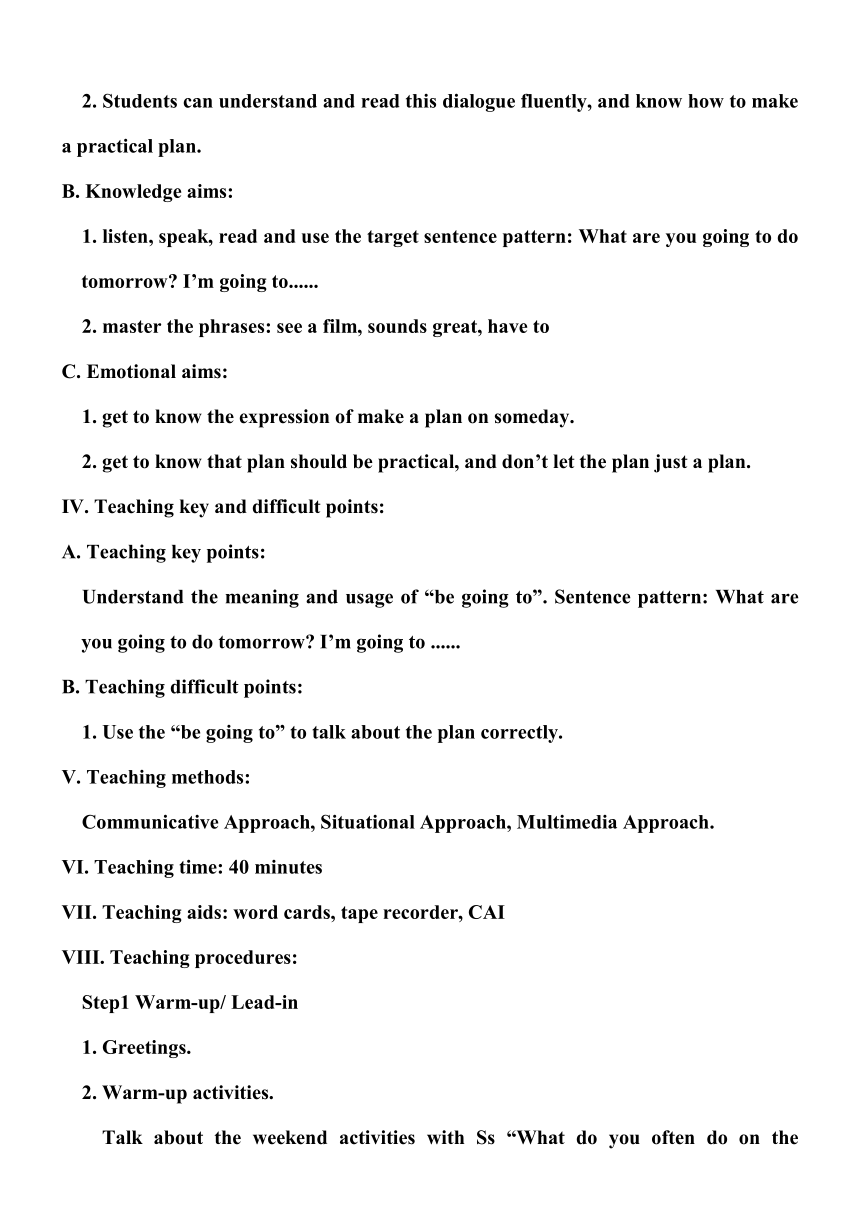Unit 3 My weekend plan PA Let’s talk 全英教案(含反思)
文档属性
| 名称 | Unit 3 My weekend plan PA Let’s talk 全英教案(含反思) |

|
|
| 格式 | zip | ||
| 文件大小 | 75.0KB | ||
| 资源类型 | 教案 | ||
| 版本资源 | 人教版(PEP) | ||
| 科目 | 英语 | ||
| 更新时间 | 2019-12-08 00:00:00 | ||
图片预览


文档简介
Unit 3 My weekend plan
Part A Let’s try & Let’s talk
I. The analysis of the teaching contents:
The topic of this unit is “weekend plan”. The topic is related to our daily life, so it is helpful to raise the Ss' learning interests. This section is the first part of this unit. In this lesson, the main point is help students understand the meaning and usage of “be going to”. After learning, students are able to use “be going to” to ask and answer. And can make a brief plan. Also the students need to master the phrases: see a film, sounds great, have to. What’s more teacher should help students review the learned knowledge. If the Ss can learn it well, it will be helpful to make the Ss learn the rest of this topic.
II. The analysis of the students:
The students in 6 have learned English for more than three years. They have learned the similar topic “What do you often do?”. So they can understand many words and some difficult sentences. As the Grade 6 students, they mainly want to express their opinions and plans. Therefore, they have strong interest and confidence in studying English. Besides, they can do well in group work, which is helpful to finish the survey part.
III. Teaching aims and demands:
By the end of this lesson, the students will be able to
A. Ability aims:
1. Use the sentence pattern “What are you going to do tomorrow? I’m going to ...” to ask and answer what they will do.
2. Students can understand and read this dialogue fluently, and know how to make a practical plan.
B. Knowledge aims:
1. listen, speak, read and use the target sentence pattern: What are you going to do tomorrow? I’m going to......
2. master the phrases: see a film, sounds great, have to
C. Emotional aims:
1. get to know the expression of make a plan on someday.
2. get to know that plan should be practical, and don’t let the plan just a plan.
IV. Teaching key and difficult points:
A. Teaching key points:
Understand the meaning and usage of “be going to”. Sentence pattern: What are you going to do tomorrow? I’m going to ......
B. Teaching difficult points:
1. Use the “be going to” to talk about the plan correctly.
V. Teaching methods:
Communicative Approach, Situational Approach, Multimedia Approach.
VI. Teaching time: 40 minutes
VII. Teaching aids: word cards, tape recorder, CAI
VIII. Teaching procedures:
Step1 Warm-up/ Lead-in
1. Greetings.
2. Warm-up activities.
Talk about the weekend activities with Ss “What do you often do on the weekend?”. Then ask them “What are you going to do this weekend?” to know their study condition. Teacher uses “Sounds great.” “Have a good time.” to praise Ss.
3. Lead-in activities.
Teacher plays recording and let Ss listen and match “What is the teacher going to do this weekend”. Give the sentence pattern for aid “You are going to… on ….”
Step 2 Presentation and practice
1. Guessing game.
Show the picture of Sarah and Mike that they are on the phone. Let students guess “What are they going to do on the weekend?” .Give the sentence pattern “She/He is going to......” to help Ss express correctly.
2. Move to Let’s try, and read and briefly explain the questions for the following listening. Check the answer and explain the reasons. Teach the phrases “have to”.
3. Listen again and find out “What are they going to do on Saturday?”. Then fill in the table of Mike’s and Sarah’s weekend plan. Ss answer and put the word cards on the blackboard.
4. Ss guess “What are they going to do on Sunday?”. Then go on listen to the tape and answer. Ss fill in the rest of the table and put word cards on blackboard.
5. Play the video of “Let’s talk” for Ss. Then have Ss read after the tape two times.
6. Cartoon dubbing. Ss work in pairs and then do the cartoon dubbing.
Step 3 Production
1. Do a survey: “My and my partners’ weekend plan”. Ss ask and answer “What are you going to do this weekend?” “I’m going to ...”. Then group leader make a report.
2. Read a picture-book “Holiday plans” together with music. Teacher ask “What are you going to do on Mother’s Day/ Father’s Day...”.
3. Teacher makes a holiday plan as an example for Ss. And have Ss make their own holiday plan (Halloween).
IX. Homework
1. Read the text fluently after class.
2. Make a practical holiday plan for Halloween
X. Blackboard design:
My weekend plan
What are you going to do this weekend?
I am going to see a film.
be (am is are) going to≈will
XI. Reflection:
在热身和导入环节,我由weekend引入话题,与学生自由对话,谈论周末常做的事情,激发学生表达兴趣,也唤醒表达做某事的旧知,为之后的学习做铺垫。我在ppt上呈现一些活动的图片,辅助学生组织思维和口语表达。之后学生听教师自己的周末安排并连线,导入到I am going to… 的学习中来,少部分学生可以用目标语表达“周末将要做某事”。
在呈现部分,我整合了Let’s try 和Let’s talk的内容。这两部分都立足于Mike和Sarah打电话时的对话,在语篇上非常连贯,因此我通过一张表格将两部分贯通。先引导学生猜测两人的周末安排,给出目标句型“He/She is going to…”“They are going to…”辅助学生表述;再让学生在听力中抓取信息,填空表格并将单词卡片对应到人物;最后通过表格回顾Mike和Sarah的周末活动。在学生猜测过程中,我使用Sounds great!和Have a good time!进行反馈,潜移默化中让学生理解他们的意思;在听力Let’s try时,用must 阐释have to 的意义。这样学生在学习课文时便更顺畅了。
在巩固环节,通过调查表活动让学生开口询问并回答自己的周末活动,并落实到书写上。我先为学生在白板纸上做示范,引导学生进行调查活动,并为team leader的汇报做示范。之后在音乐中与学生一起赏读绘本“My Holiday Plan”,读得过程中也引导学生思考“What are you going to do on that holiday?”学生联系实际和节日特点进行表达。最后引到即将来临的万圣节活动上,教师展示自己的万圣节计划,并引导鼓励学生规划自己的万圣节计划,书写在worksheet上。教师对plan提出要求“Make a practical plan and make it come true.”。
Part A Let’s try & Let’s talk
I. The analysis of the teaching contents:
The topic of this unit is “weekend plan”. The topic is related to our daily life, so it is helpful to raise the Ss' learning interests. This section is the first part of this unit. In this lesson, the main point is help students understand the meaning and usage of “be going to”. After learning, students are able to use “be going to” to ask and answer. And can make a brief plan. Also the students need to master the phrases: see a film, sounds great, have to. What’s more teacher should help students review the learned knowledge. If the Ss can learn it well, it will be helpful to make the Ss learn the rest of this topic.
II. The analysis of the students:
The students in 6 have learned English for more than three years. They have learned the similar topic “What do you often do?”. So they can understand many words and some difficult sentences. As the Grade 6 students, they mainly want to express their opinions and plans. Therefore, they have strong interest and confidence in studying English. Besides, they can do well in group work, which is helpful to finish the survey part.
III. Teaching aims and demands:
By the end of this lesson, the students will be able to
A. Ability aims:
1. Use the sentence pattern “What are you going to do tomorrow? I’m going to ...” to ask and answer what they will do.
2. Students can understand and read this dialogue fluently, and know how to make a practical plan.
B. Knowledge aims:
1. listen, speak, read and use the target sentence pattern: What are you going to do tomorrow? I’m going to......
2. master the phrases: see a film, sounds great, have to
C. Emotional aims:
1. get to know the expression of make a plan on someday.
2. get to know that plan should be practical, and don’t let the plan just a plan.
IV. Teaching key and difficult points:
A. Teaching key points:
Understand the meaning and usage of “be going to”. Sentence pattern: What are you going to do tomorrow? I’m going to ......
B. Teaching difficult points:
1. Use the “be going to” to talk about the plan correctly.
V. Teaching methods:
Communicative Approach, Situational Approach, Multimedia Approach.
VI. Teaching time: 40 minutes
VII. Teaching aids: word cards, tape recorder, CAI
VIII. Teaching procedures:
Step1 Warm-up/ Lead-in
1. Greetings.
2. Warm-up activities.
Talk about the weekend activities with Ss “What do you often do on the weekend?”. Then ask them “What are you going to do this weekend?” to know their study condition. Teacher uses “Sounds great.” “Have a good time.” to praise Ss.
3. Lead-in activities.
Teacher plays recording and let Ss listen and match “What is the teacher going to do this weekend”. Give the sentence pattern for aid “You are going to… on ….”
Step 2 Presentation and practice
1. Guessing game.
Show the picture of Sarah and Mike that they are on the phone. Let students guess “What are they going to do on the weekend?” .Give the sentence pattern “She/He is going to......” to help Ss express correctly.
2. Move to Let’s try, and read and briefly explain the questions for the following listening. Check the answer and explain the reasons. Teach the phrases “have to”.
3. Listen again and find out “What are they going to do on Saturday?”. Then fill in the table of Mike’s and Sarah’s weekend plan. Ss answer and put the word cards on the blackboard.
4. Ss guess “What are they going to do on Sunday?”. Then go on listen to the tape and answer. Ss fill in the rest of the table and put word cards on blackboard.
5. Play the video of “Let’s talk” for Ss. Then have Ss read after the tape two times.
6. Cartoon dubbing. Ss work in pairs and then do the cartoon dubbing.
Step 3 Production
1. Do a survey: “My and my partners’ weekend plan”. Ss ask and answer “What are you going to do this weekend?” “I’m going to ...”. Then group leader make a report.
2. Read a picture-book “Holiday plans” together with music. Teacher ask “What are you going to do on Mother’s Day/ Father’s Day...”.
3. Teacher makes a holiday plan as an example for Ss. And have Ss make their own holiday plan (Halloween).
IX. Homework
1. Read the text fluently after class.
2. Make a practical holiday plan for Halloween
X. Blackboard design:
My weekend plan
What are you going to do this weekend?
I am going to see a film.
be (am is are) going to≈will
XI. Reflection:
在热身和导入环节,我由weekend引入话题,与学生自由对话,谈论周末常做的事情,激发学生表达兴趣,也唤醒表达做某事的旧知,为之后的学习做铺垫。我在ppt上呈现一些活动的图片,辅助学生组织思维和口语表达。之后学生听教师自己的周末安排并连线,导入到I am going to… 的学习中来,少部分学生可以用目标语表达“周末将要做某事”。
在呈现部分,我整合了Let’s try 和Let’s talk的内容。这两部分都立足于Mike和Sarah打电话时的对话,在语篇上非常连贯,因此我通过一张表格将两部分贯通。先引导学生猜测两人的周末安排,给出目标句型“He/She is going to…”“They are going to…”辅助学生表述;再让学生在听力中抓取信息,填空表格并将单词卡片对应到人物;最后通过表格回顾Mike和Sarah的周末活动。在学生猜测过程中,我使用Sounds great!和Have a good time!进行反馈,潜移默化中让学生理解他们的意思;在听力Let’s try时,用must 阐释have to 的意义。这样学生在学习课文时便更顺畅了。
在巩固环节,通过调查表活动让学生开口询问并回答自己的周末活动,并落实到书写上。我先为学生在白板纸上做示范,引导学生进行调查活动,并为team leader的汇报做示范。之后在音乐中与学生一起赏读绘本“My Holiday Plan”,读得过程中也引导学生思考“What are you going to do on that holiday?”学生联系实际和节日特点进行表达。最后引到即将来临的万圣节活动上,教师展示自己的万圣节计划,并引导鼓励学生规划自己的万圣节计划,书写在worksheet上。教师对plan提出要求“Make a practical plan and make it come true.”。
同课章节目录
